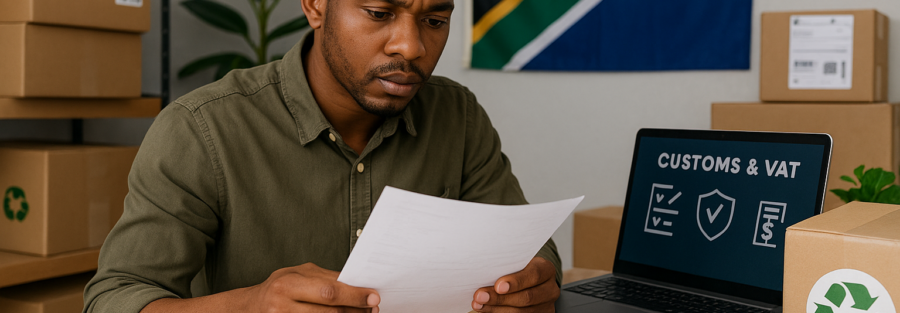In South Africa’s dynamic online retail market, businesses that deal in imported goods or engage in exports face complex tax considerations that impact their bottom line and compliance obligations. As an online retailer, understanding import duties, environmental levies, and Value Added Tax (VAT) on exports is essential to navigating these costs and optimizing pricing strategies.
1. Import Duties: Understanding the Basics
Import duties are taxes levied on goods brought into South Africa from foreign countries. These taxes are charged at varying rates depending on the type of goods and their classification under the Harmonized System (HS) codes. For online retailers who import products, understanding and accounting for these duties can significantly impact pricing, cost of goods, and competitiveness.
How Import Duties Work for Online Retailers:
- Classification and Calculation: The South African Revenue Service (SARS) requires that each product is classified under a specific tariff heading, determining the applicable duty rate. Different categories (e.g., electronics, clothing, or cosmetics) have specific duty rates that are essential to know beforehand to calculate the total landed cost.
- Customs Valuation: Import duties are calculated based on the customs value of goods, which includes the cost, insurance, and freight (CIF) value. Ensuring accuracy in customs valuation is crucial, as under-declaration or errors can lead to penalties.
- Impact on Pricing: For online retailers, import duties influence the final sale price of goods. Retailers may choose to absorb some or all of these costs to remain competitive, or they may pass them on to the consumer.
Online retailers who correctly classify goods, document values accurately, and stay informed about duty rates can better control costs and ensure compliance. Working closely with customs brokers and using automation tools to streamline duty calculations are also useful steps.
2. Environmental Levies: The Green Cost of Doing Business
South Africa imposes environmental levies on specific products, including those that may be relevant for online retailers. These levies aim to reduce environmental impact by charging extra for products that may harm the environment, incentivizing companies to adopt more sustainable practices. Environmental levies can affect businesses importing items like electronics, plastics, and chemicals, which are often targeted due to their potential for pollution and resource depletion.
How Environmental Levies Affect Online Retailers:
- Types of Levies: Examples include levies on plastic bags, electronics, and carbon emissions. If your business imports products with environmental implications (e.g., batteries or electronics with e-waste potential), these levies will add to the import costs.
- Compliance and Reporting: Online retailers must ensure they meet compliance requirements, which may include reporting quantities and types of goods subject to environmental levies. Accurate reporting helps avoid penalties and contributes to transparency in sustainable practices.
- Sustainability Considerations: To align with consumer demand for eco-friendly products, online retailers might consider offering environmentally friendly alternatives or participate in recycling programs. Such initiatives can help mitigate environmental costs and attract a more sustainability-focused customer base.
3. VAT on Imports: Key Points to Consider
When importing goods into South Africa, VAT is charged at the standard rate of 15%. VAT on imports is generally paid to SARS at the time of import, which means that the importer must factor this cost into their overall import expenditure.
Considerations for VAT on Imports:
- Input VAT Deduction: VAT on imports may be claimed as an input VAT deduction, provided that the goods are used for business purposes. This deduction can help offset VAT liabilities, though it’s important to maintain thorough records and proper documentation to support claims.
- Deferred VAT Payments: Certain registered importers may be eligible for deferred VAT payments on imports, easing cash flow challenges. This arrangement allows qualifying businesses to delay the VAT payment until the next VAT return submission, reducing upfront costs.
- Customs and VAT Compliance: Adhering to customs regulations and ensuring accurate VAT reporting on imports is essential to avoid penalties and ensure tax compliance. Automated tools can streamline this process, making it easier to maintain accurate VAT records.
4. VAT on Exports: Zero-Rated Supplies and Compliance
For online retailers exporting goods, VAT is generally applied at a zero rate, meaning that exports are VAT-free. However, businesses must meet specific compliance requirements to qualify for this zero-rating. The zero-rating of VAT on exports encourages South African businesses to participate in international trade by removing VAT costs from exports, allowing competitive pricing for foreign customers.
Requirements for VAT Zero-Rating on Exports:
- Direct Exports: For VAT zero-rating to apply, the sale must qualify as a direct export, where the goods are sent directly to a foreign buyer. Proper export documentation, such as customs forms and proof of delivery outside South Africa, is critical for proving eligibility.
- Indirect Exports: When a local buyer arranges for goods to be exported, the transaction may be subject to VAT at the standard rate, as it does not qualify for zero-rating. It’s essential to distinguish between direct and indirect exports to avoid VAT discrepancies.
- Compliance and Documentation: SARS requires specific documentation to substantiate VAT zero-rated exports, including customs declarations and proof of export. Failing to provide the necessary documents can lead to denied claims, impacting cash flow and profit margins.
5. Practical Steps for Online Retailers to Manage Import and Export Tax Obligations
Navigating import duties, environmental levies, and VAT can be complex. Here are some practical steps to simplify these tax obligations and support compliance:
- Invest in Customs and VAT Software: Automated tools can streamline customs classifications, calculate import duties, and ensure accurate VAT reporting. Specialized software may also help manage environmental levy calculations.
- Engage with Customs Brokers and Tax Consultants: Working with experts can help online retailers ensure accurate compliance with import/export requirements, avoid penalties, and identify potential savings.
- Maintain Accurate Documentation: Proper documentation for import valuations, VAT claims, and export records is vital. Keeping a well-organized record-keeping system minimizes risks and supports tax filings.
- Leverage Input VAT Deductions: Take advantage of input VAT deductions on imports to reduce VAT liabilities. Ensure that your goods are strictly used for business purposes to qualify for these deductions.
- Adopt Sustainable Practices: Consider alternatives to environmentally taxed products or participate in recycling programs to appeal to eco-conscious consumers. Sustainable practices can minimize environmental levies and enhance your brand’s appeal.
Conclusion
For South African online retailers, managing import duties, environmental levies, and VAT on exports is an integral part of running a compliant and cost-effective business.
By understanding these obligations and implementing strategies to manage costs, retailers can improve their bottom line and position themselves for sustainable growth in both the local and international markets. Taking proactive steps such as leveraging automation, maintaining thorough documentation, and consulting tax experts can help ensure compliance and smooth operations.





